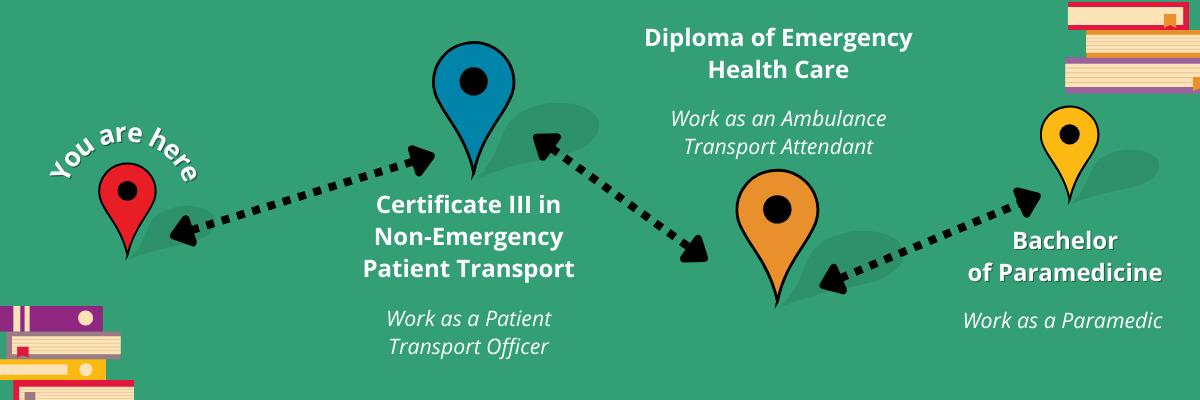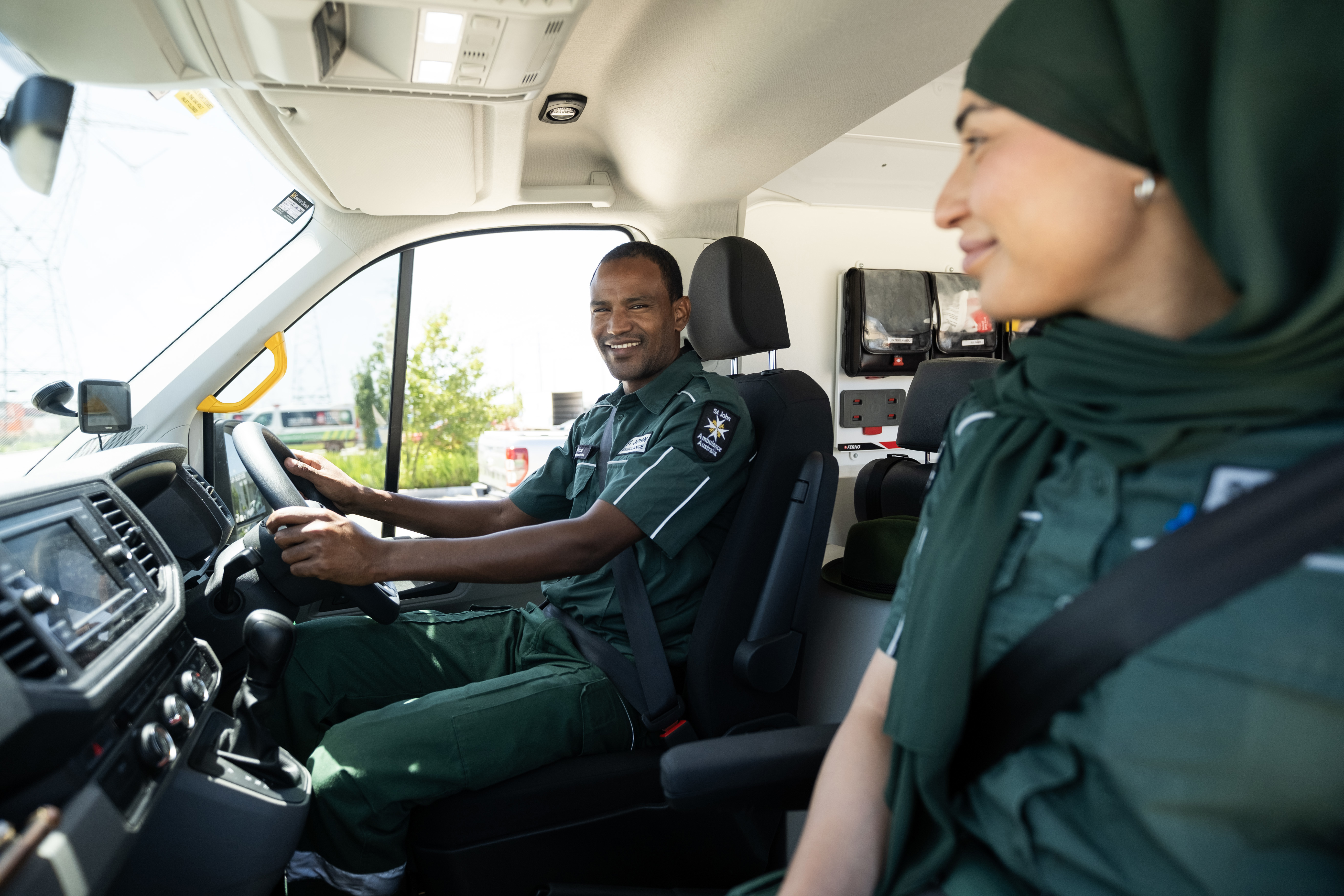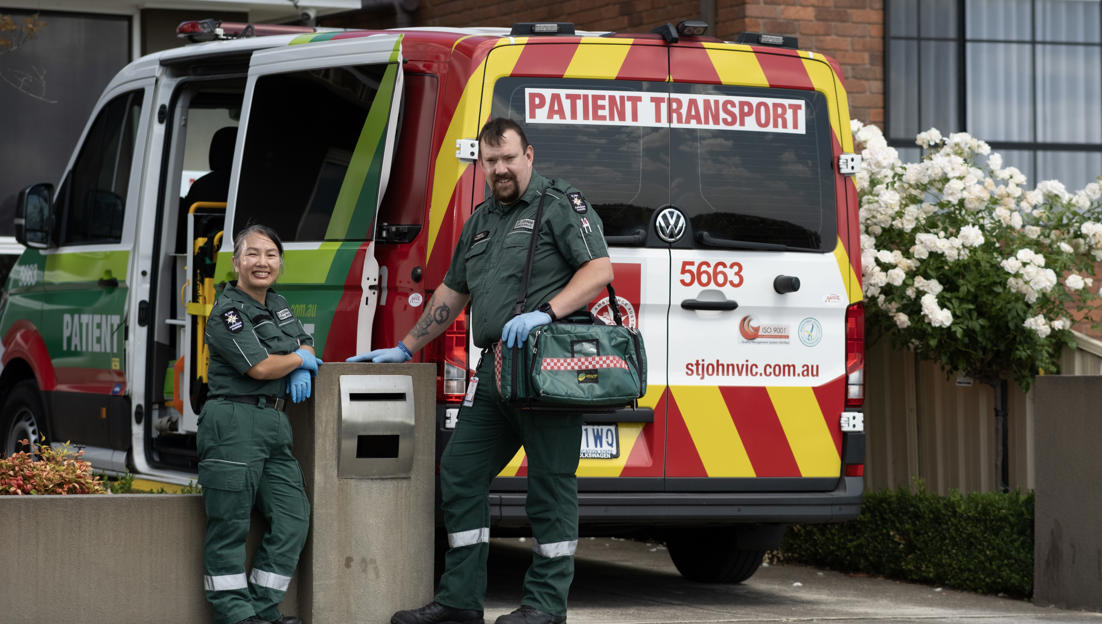HLT31120 Certificate III Non-Emergency Patient Transport

Become a Non-emergency Patient Transport officer and be ready to work in the industry in 6 months.
HLT31120 Certificate III Non-emergency Patient Transport
Enquire now to learn more about the course and the career.
Enquire NowAs one of the largest providers of NEPT in Victoria, patient transport is our business. Our Trainers work in the industry and know how to skill you as a Patient Transport Officer to the highest standards, ensuring you are work-ready as soon as you graduate. That's why our training produces the best quality candidates and we prefer to recruit our own staff from course graduates.
Upcoming Course Start Dates
- 6th August, Clayton – Wednesdays
- 2nd September, Keilor East – Tuesdays
- 29th September, Clayton – Mondays
- 3rd October, Bendigo – Fridays
- 6th November, Geelong - Thursdays
On-Demand Webinar
Watch our Non-Emergency Patient Transport webinar and hear first-hand from our team. Learn all about Non-emergency Patient Transport courses and careers, and get an understanding what a day looks like in the role.

Hosted By:
Morgan (Ambulance Transport Attendant & Clinical Instructor), James (Ambulance Transport Attendant & Clinical Instructor) and Monica (Patient Transport Officer).
Curious about what it's like to study this course? Watch the Video
The Qualification
This qualification reflects the role of workers such as non-emergency patient transport officers who provide non-emergency transport and care for patients who have a low or medium acuity or chronic illness or disability and require transportation. Workers in this role provide appropriate patient assessment, follow procedures for safe removal of a patient for transport for pre-arranged or booked transport service and the time of response is not given high priority in comparison to emergency transport.
The Promise
On successful completion of the course and application to careers@stjohnvic.com.au, graduates will be guaranteed an initial telephone interview for vacant Patient Transport Officer positions in the Non-Emergency Patient Transport division.
We have a strong preference to employ St John graduates as we are confident in the delivery of our training and find that our graduates are most job ready. So far, we have employed over 132 graduates of this course into our Non-Emergency Patient Transport division at St John as Patient Transport Officers.
Ready to Enrol?
Enrol online to secure your place. Call 03 8588 8398 for assistance if required.
Have Some Questions?
Speak to us to find out more on 03 8588 8398 (Available Monday-Friday 9:00AM - 4:30PM AEST)
Watch how Harry has grown his career as a Patient Transport Officer with St John
Course Delivery
There are 13 units in the Certificate III Non-Emergency Patient Transport. These are listed below. Students will be required to attend one of our training facilities:
- St John Ambulance, 601 Blackburn Road, Notting Hill, VIC 3168
- St John Ambulance, Unit 8, 16A Keilor Park Drive, Keilor East, VIC, 3033
- Geelong Football Umpires' League, Kardinia Park, Geelong, VIC, 3220
- St John Ambulance, 3 Endeavour Way, Alfredton/Ballarat, VIC, 3350
| Unit Code and Name |
|---|
| HLTAID011 Provide first aid |
| HLTOUT008 Manage a Scene |
| BSBMED301 Interpret and apply medical terminology appropriately |
| CHCDIV001 Work with diverse people |
| HLTAAP001 Recognise healthy body systems |
| HLTINF006 Apply basic principles and practices of infection prevention and control |
| HLTOUT001 Implement safe access and egress |
| HLTOUT007 Transport non-emergency patients under operational conditions |
| HLTOUT010 Communicate in complex situations to support health care |
| HLTWHS002 Follow safe work practices for direct client care |
| HLTWHS005 Conduct manual tasks safely |
| HLTWHS006 Manage personal stressors in the work environment |
| HLTOUT004 Assess and deliver basic clinical care |
Course Requirements
This course consists of 19 days of face-to-face workshops and 8 placement shifts (available on Tuesdays to Fridays) with St John. Students are also required to complete self-paced workbooks, and self-guided learning. Students are given 6 months from course commencement date to complete the course. For Face-to-face sessions, placement shifts and simulated training, students will be required to attend one of our training facilities.
Additional Requirements
To commence in this course, you are required to have:
- Full Driver’s Licence or Green P Plates (Red P and L plates not accepted).
- Current working with children check
- Current Police check
- Students must have a laptop or tablet which is wi-fi enabled
- Proof of vaccinations for current Influenza (within the last 12 months), Hepatitis B, Varicella, Pertussis, Measles/Mumps/Rubella, with serology report (required before commencing placement shifts)
- Students must be clean shaven for infection control (PPE requirements) on placement shifts


Course Fees
Course fees can be paid in fortnightly instalments through EzyPay when you enrol online, via Zip or direct payments.
| EzyPay | Direct Payment | ZIP |
|
Course fee: $4995
|
Course fees are $4995
|
This course is eligible for Zip payments. Click to find out more. |
Payment must be made in full before the certificate of completion can be issued.
The $600 deposit is non-refundable. The remainder of the course fees may be refunded or partially refunded in certain circumstances in accordance with our Terms and Conditions.
If you wish to transfer after enrolment from one course date to another, a $50 administration fee will apply to reschedule.


The $600 deposit is non-refundable. The remainder of the course fees may be refunded or partially refunded in certain circumstances in accordance with our Terms and Conditions.
FAQS
Employment
HLT31120 Certificate III in Non-Emergency Patient Transport is required for a range of professional titles. Potential job roles related to this qualification include non-emergency patient transport officer, ambulance community officer, and private sector patient transport officer. Units of Competency achieved may provide a pathway to other qualifications, especially those related to patient transport and pre-hospital care knowledge.
On successful completion of the course, graduates will be guaranteed an initial telephone interview for vacant Patient Transport Officer positions in the Non-Emergency Patient Transport division.
We have a strong preference to employ St John graduates as we are confident in the delivery of our training and find that our graduates are most job ready. So far, we have employed over 132 graduates of this course into our Non-Emergency Patient Transport division at St John as Patient Transport Officers.
Positions can be casual, part-time or full-time. The availability of each type can depend on operational needs and your preference.
Shifts can be quite flexible. Some roles may offer a variety of shifts to suit different lifestyles, including day, night, and weekend shifts.
Rosters can vary, but typically involve a mix of different shift lengths and times throughout the week. The roster might include a combination of morning, afternoon, and night shifts, depending on hours and your availability.
Night shifts could be grouped together or spread across the week, depending on operational requirements and your preferences.
Casual roles do not require a fixed number of hours per week, allowing for more flexibility.
Yes, if you already have relevant qualifications, you may be able to apply directly for a role. Please visit our careers page for more information.
There are no age restrictions, some St John employees are even retired paramedics.
You will however have to have your full license to work in Patient Transport with St John
The Role
The role involves transporting non-emergency patients, typically with medium or low acuity, to and from medical facilities. This includes ensuring the patient's safety, comfort, and well-being during the journey. The role may also require assisting patients with mobility issues, monitoring their condition, and communicating any relevant information to medical staff upon arrival.
A typical day could involve:
- Taking clients to medical appointments.
- Responding to 000 calls that are deemed non-time critical
- Responding to non-time critical events that escalate into time-critical events.
- Comforting patients and their family members.
Low Acuity
- Phil: A well-known walker dialysis patient that is transported 6 times per week. It seems like he is having an especially good day.
- Philis: Who is going to a new, unknown clinic today because her test results indicate a resurgence of cancer and she is wobbly on her feet and really unsure.
- David: Who narrowly escaped with his life after a sudden cardiac event and is flying back home via Air Ambulance with a new heart valve.
Medium Acuity
- Jaqueline: Who tripped on her pyjama pants and ended up on the ground.
- Mark: Who lives alone and takes blood thinners tripped over his beloved cat and his head has gone through some dry wall.
- Mary: Who came into the GP office with signs of stroke and St John were asked to assist with transport to hospital on a signal one.
Salary can vary based on the role, experience, shift days and times and whether the position is casual, part-time or full-time. Weekend penalties, night loadings and public holiday loadings available. There is also a tax deductible $18 meal allowance per shift.
St John Ambulance Victoria also provides salary packaging through Maxxia, allowing more of your pay to be tax free.
While the role requires understanding medical information, the training provided aims to equip you with the necessary skills and confidence. Continuous support and on-the-job learning help mitigate any feelings of being out of depth.
St John Ambulance Victoria offers opportunities for ongoing professional development and upskilling. This might include additional certifications, workshops, and on-the-job training.
The Course
There are no pre-requisite requirements in order to be eligible to undertake the Certificate III in Non-Emergency Patient Transport.
There are numerous requirements for completing a Certificate III in Non-Emergency Patient Transport. As a student, you are required to complete 19 days of face-to-face training workshops, self-paced workbooks, and self-guided learning. You are given six months to complete the course.
To complete the face-to-face sessions, placement shifts, and simulated training programs you will be required to attend one of our training facilities. You will also need a driver's license, a working with children check, police check and proof of vaccinations, among many other requirements.
The HLT31120 Certificate III in Non-Emergency Patient Transport is suited to anyone who wants to gain entry to the patient transport industry and provide non-emergency transport and care services to patients with low risk injuries, chronic illnesses or disabilities. This qualification is ideal for those who enjoy working with others as part of a team, and who like to provide high levels of customer service.
Certificate III in Non-Emergency Patient Transport consists of 19 days of face-to-face training workshops, which are offered one day each week. There are also 8 placement shifts with St John, which are available Tuesdays to Fridays. As a student doing HLT31120, you are given six months to complete the entire course. Certificate III in Non-Emergency Patient Transport is designed to be flexible, accessible, and rewarding.
The Certificate III in Non-Emergency Patient Transport offers pathways for Recognition of Prior Learning (RPL) and Credit Transfer, allowing you to fast-track your qualification based on your previous experience and education.
Recognition of Prior Learning (RPL)
If you have prior work experience or have developed skills relevant to patient transport or healthcare, you may be eligible for RPL. This process assesses your existing knowledge and skills against the qualification requirements, reducing the time and study needed to complete the course.
Credit Transfer
If you have previously completed formal qualifications or units of competency that are relevant to this course, you may be eligible for credit transfer. This allows you to receive credit for units you've already completed, eliminating the need to repeat learning.
If you believe you may have some or all of the knowledge and skills covered in the units of competency, you may apply for Recognition of Prior Learning.
If you would like to apply for Recognition of Prior Learning, download and complete this form and forward to nept.training@stjohnvic.com.au
Yes, training includes how to manage and cope with unpredictable or aggressive patients, ensuring the safety and well-being of both the patient and the staff member.
Support is often available outside of workshop hours, including access to trainers, online resources, and peer support to help complete self-guided workbooks and modules.
The current cost to complete the Certificate III in Non-Emergency Patient Transport is $4,995. Although there are currently no government subsidies, flexible payment options are available including ZIP Pay.
You can complete the NEPT course on your Green P Plates. You will then need to wait until you have your full license before St John can hire you. Red P Plates and Learner Permits cannot begin the NEPT course.
The 19 face-to-face training days are designed to provide hands-on experience and essential skills. These days include practical exercises, assessments, and interactive learning sessions.
If you miss any face-to-face training days, you may be able to make-up the day at another location or wait until another class intake is covering that content. There may be a charge of $25 for make-up days.
8.30am - 4.30pm
It is the same day each week over the 19 days
There are a maximum of 12 students in a class.
No, unless you don’t start working in the industry for a long time afterwards you shouldn’t need to redo it.
Yes it is a Nationally Recognised qualification
Assessment Information
A successful outcome for this certificate will be determined by a range of different assessment methods including written assessment (questionnaire), observation of simulated and practical activities etc. during placement. You will be required to demonstrate CPR on a manikin on the floor.
Participants will also be required to undertake a wide range of manual handling tasks in preparation for future employment.
All the Assessment Task Workbooks will be provided by your trainer in Microsoft Word or PDF. You
will need to complete your answers in the workbook and email to your trainer. Your trainer will provide you feedback in your workbook. In the Assessment Task Workbook, each assessment task provides explicit instructions on how to complete the task.
Skills and Qualifications
Patient Transport Skills and Qualifications
Customer Service, Customer Focus, Bedside Manner, Physical Fitness, Verbal Communication, Listening, Documentation Skills, Decision Making, Patient Services, Health Care Administration, Health Promotion and Maintenance
Additional Information
Patient Transport Job Duties generally include:
- Transports patients by assisting patients in and out, ambulances, cars, and helicopters; lifting patients on and off beds; moving them to and from particular service and treatment areas, and operating rooms; using wheelchairs or moveable beds.
- Comforts patients and their families by offering support and encouragement; being punctual and attentive to procedure schedules; demonstrating caring and cultural sensitivity.
- Transports equipment and supplies by picking-up requisitioned orders; delivering them to assigned treatment areas and patient care areas.
- Transports laboratory specimens by picking-up specimens and delivering them to specified laboratory.
- Maintains safe, secure, and healthy work environment by following standards and procedures; complying with federal and state legal regulations and Joint Commission on Accreditation of Healthcare Organizations (JCAHO) requirements.
- Updates job knowledge by participating in educational opportunities.
- Enhances health care organisation reputation by accepting ownership for accomplishing new and different requests; exploring opportunities to add value to job accomplishments.
Credit Transfer and Recognition of prior learning (RPL)
The Certificate III in Non-Emergency Patient Transport offers pathways for Recognition of Prior Learning (RPL) and Credit Transfer, allowing you to fast-track your qualification based on your previous experience and education.
Recognition of Prior Learning (RPL)
If you have prior work experience or have developed skills relevant to patient transport or healthcare, you may be eligible for RPL. This process assesses your existing knowledge and skills against the qualification requirements, reducing the time and study needed to complete the course.
Credit Transfer
If you have previously completed formal qualifications or units of competency that are relevant to this course, you may be eligible for credit transfer. This allows you to receive credit for units you've already completed, eliminating the need to repeat learning.
If you believe you may have some or all of the knowledge and skills covered in the units of competency, you may apply for Recognition of Prior Learning.
If you would like to apply for Recognition of Prior Learning, download and complete this form and forward to nept.training@stjohnvic.com.au
Career Pathways



